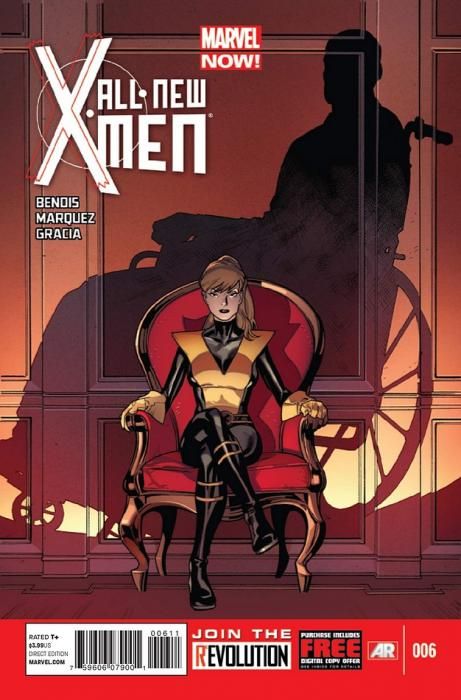"All-New X-Men" #6 by Brian Bendis and David Marquez launches the second major storyline for the strangest teens of all, mere weeks after they arrived in the Marvel Universe's present. With the team now properly embedded in the Jean Grey School, it falls to Kitty Pryde to pass on the teachings of Xavier and help the team adjust to their new situation.
Incoming artist David Marquez is an excellent choice to replace Immonen. Their styles are broadly similar and their strengths are in the same areas -- well-paced storytelling, big action panels, subtle emotive detail -- but not to the extent that Marquez seems like an imitation. He's perfect for a book about teenagers, where youth needs to come across in a character's posture and attitude, not just dialogue.
However, after five issues that rank as some of the strongest he's written in years, there are areas where Bendis appears to shows some uncharacteristic weaknesses. Wolverine's flip-flopping attitude towards Past-Scott is often confusing, skipping straight from attempted murder to attempted mentor and back, sometimes within the space of a single panel. Readers know Bendis can write Wolverine from his time on "New Avengers," so maybe it's a deliberate attempt to show Wolverine through Past-Scott's eyes. If so, it's not clear, which makes Logan's irrationality too distracting to dismiss.
Similarly, there's an admittedly funny scene where Cyclops finds it hard to adjust to the future's altered culture, but the jokes really rely on Past-Scott coming explicitly from the sixties. Unless we're getting a piece of the temporal puzzle (i.e. the past-X-Men are from some alternate '60s-verse, not the Marvel Universe's past), readers are left thinking about the mechanics rather than the comedy.
Despite those minor hiccups, though, it's an excellent read. The plot only really turns up on the last page, but that doesn't matter because every interaction that precedes it is so compelling and readable -- Kitty and Jean, Storm and Jean, Angel and his future self -- it's one of Bendis' strengths that we don't care that these characters aren't really doing anything, we just want to read their conversations and spend time with them.
At the moment, every issue of "All-New X-Men" raises as many questions as it answers, and in a way, that's the key to its success. It's rare a comic can leave today's over-informed readers so flummoxed, but this one manages to do so. The possibilities seem endless, because the story treads on genuinely new ground. It's not quite "Ultimate Spider-Man" brilliant, but it's easily one of the better comics Bendis has written in some time -- and for a writer as prolific as he is, that's worth noting.

